Is Jasmine Tea Herbal
Jasmine tea is a type of scented tea where dry tea leaves, typically those from the Camellia sinensis plant green tea being the most common, are infused with the fragrance of jasmine flowers. This process enhances the tea with the sweet aroma and flavor of jasmine. The tea's history dates back to the Song Dynasty in China, where it was highly valued for its sensory appeal and potential health benefits.

Steps in Producing Jasmine Tea:
Bestsellers
- Harvesting: Tea leaves and jasmine blossoms are picked when they are ready, ensuring a high-quality base.
- Scenting: The harvested tea leaves are stored until the jasmine flowers bloom. When they do, the flowers are layered with tea leaves, allowing the natural scent to infuse the tea, a process that may be repeated multiple times for premium teas.
- Drying: Once the scenting process is complete, the tea leaves are dried again to preserve the jasmine fragrance.
Jasmine tea can come in various forms, including:
- Loose-leaf: Where the tea and flowers can be infused directly in hot water.
- Bags: For convenience, where tea leaves are pre-packaged in single servings.
- Pearls: Tightly rolled tea leaves, often hand-rolled, that unfurl when steeped, providing both visual and gustatory pleasure.
Your experience with jasmine tea may vary based on the quality and preparation. Brewing it properly is key to enjoying its delicate floral flavor. Water temperature and steeping time are crucial: you typically use near-boiling water and steep for around 3 to 5 minutes, adjusting to taste.
Herbal Tea Classification
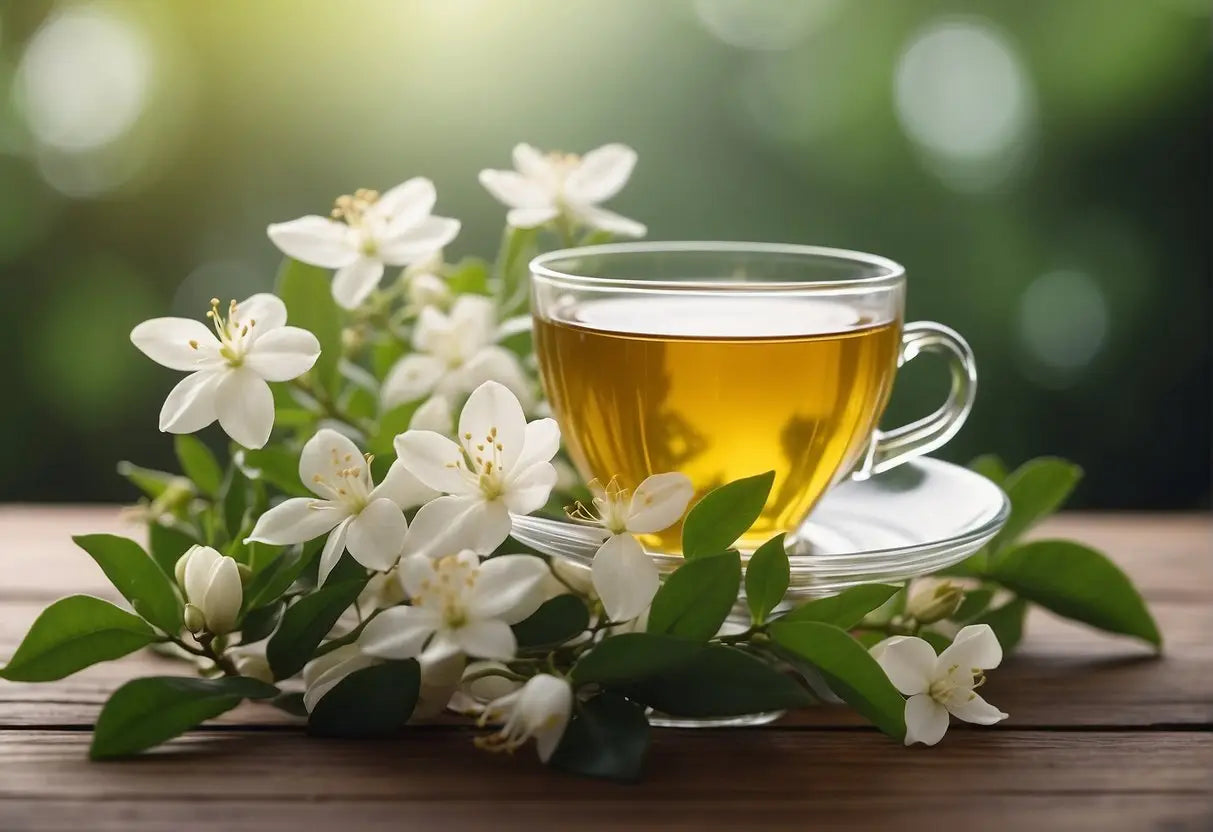
When exploring the world of teas, you'll find that herbal teas are a distinct category separate from traditional true teas. True teas, including black, green, white, and oolong, come from the Camellia sinensis plant. In contrast, herbal teas are made from a wide variety of plants, each with their own unique flavors and properties.
Herbal Tea Characteristics
- Origin: Derived from diverse plants, herbs, spices, or a combination thereof.
- Caffeine: Generally caffeine-free, but some herbs may contain mild stimulants.
- Flavor Profile: Flavors can range from sweet, floral, and fruity to spicy or earthy, depending on the ingredients.
Common Herbal Tea Ingredients
- Flowers: chamomile, hibiscus, lavender
- Leaves: peppermint, lemongrass, rooibos
- Seeds and Fruits: fennel, rosehip, berry blends
- Roots: ginger, turmeric
If you're curious about jasmine tea, it straddles the line between herbal tea and true tea. It’s typically made by scenting green tea leaves with jasmine flowers. The base tea provides caffeine, while the jasmine flowers infuse the brew with a delicate, floral aroma and flavor.
To choose a tea that suits your preferences, consider both the base plant and additional flavorings. Rooibos and chamomile are popular for their soothing properties, while ginger and turmeric are favored for potential health benefits. Always verify the ingredients to match your taste and any dietary considerations.
Health Benefits of Jasmine Tea
Jasmine tea, a fragrant beverage enjoyed worldwide, isn't just pleasing to the senses; it also offers several health benefits backed by scientific research.
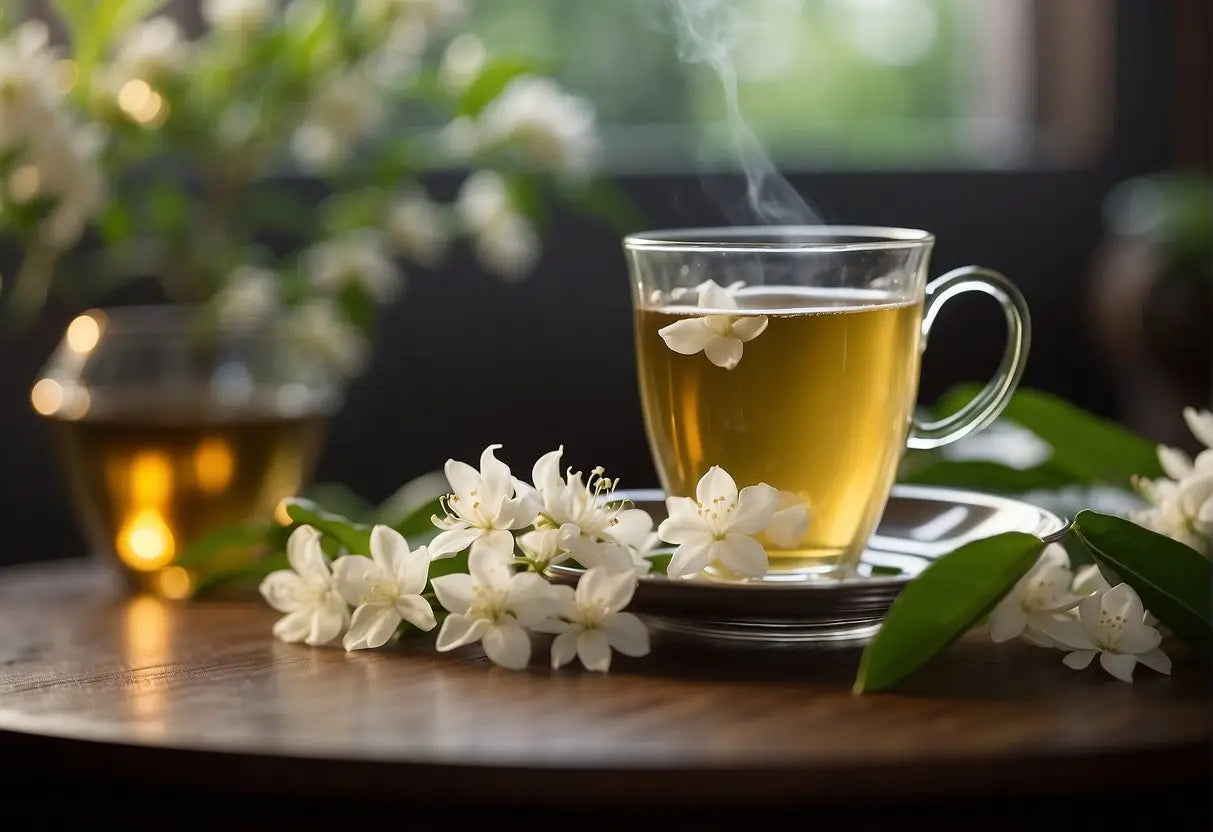
Antioxidant Properties
Jasmine tea is rich in catechins, a type of polyphenol which acts as a powerful antioxidant. These compounds help combat oxidative stress in your body, which can reduce inflammation and protect against chronic diseases.
Stress Reduction and Relaxation
Your daily cup of jasmine tea may serve as a natural stress reliever. The aroma of jasmine has sedative effects which can calm your nervous system. Drinking jasmine tea might enhance your mood and aid in relaxation.
Lao Ban Zhang
Digestive Health
Regular consumption of jasmine tea can contribute positively to your digestive health. It has been associated with boosting gastrointestinal function and aiding in the prevention of gastrointestinal disorders, owing to its anti-inflammatory properties.
Heart Health
Jasmine tea's antioxidants not only ward off chronic diseases but also have a specific role in promoting heart health. They can help lower bad cholesterol levels and improve blood circulation, reducing your risk of heart-related diseases.
Cultivation and Production of Jasmine Tea
Jasmine tea's unique aroma and flavor come from a delicate process of cultivation and production. Understanding the specifics of growing jasmine, harvesting the blossoms, and the tea scenting process unveils the intricate art behind this beloved drink.
Growing Jasmine
Your jasmine plants will thrive in a warm, tropical climate which favors their growth. Soil preparation is crucial; ensure it is well-drained, fertilized, and slightly acidic to neutral in pH. Jasmine typically blossoms in summer, with planting done in spring.
Harvesting Jasmine
The timing of the harvest is pivotal. Jasmine flowers are picked early in the morning when the petals are still closed. This helps to preserve the essential oils that hold the scent. After picking, the flowers are stored carefully to prevent bruising and are prepared for scenting while fresh.
Tea Scenting Process
During scenting, the jasmine blossoms are layered with tea leaves in a controlled environment. Here’s how it works:
- Mixing: Fresh jasmine flowers are spread among tea leaves.
- Infusing: The tea absorbs the jasmine fragrance over several hours.
- Removing: Spent blossoms are removed, and the process may repeat to intensify the aroma.
- Drying: Finally, the scented tea is dried to lock in the fragrance.
Different Types of Jasmine Tea
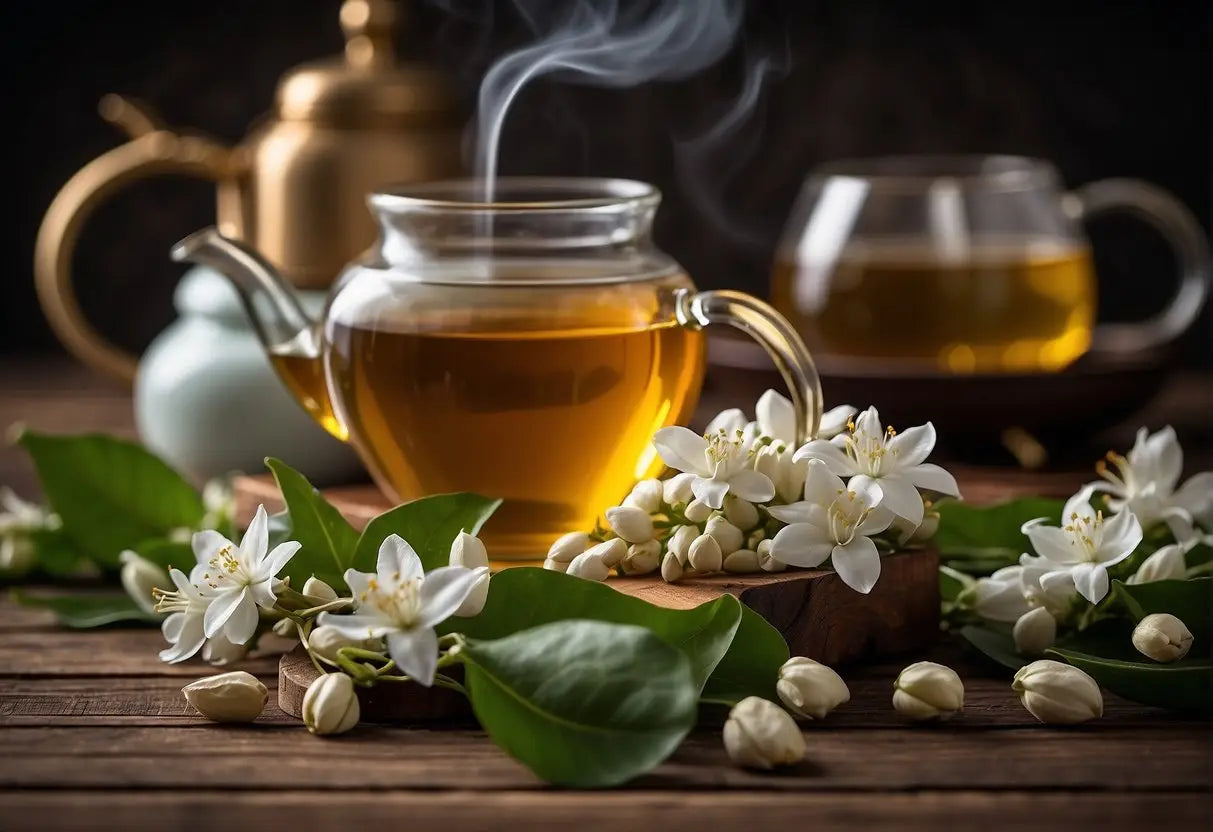
Jasmine tea is renowned for its alluring fragrance and is often made by infusing jasmine blossoms with various types of tea leaves. Familiarize yourself with the distinct characteristics of each jasmine tea type to find your preference.
Jasmine Green Tea
Jasmine Green Tea is the most common variant, celebrated for its delicate balance of light floral aroma and the fresh, grassy notes of green tea. Typically, this tea provides a smooth and comforting taste with a slightly sweet finish, making it a favored choice for daily consumption.
Jasmine White Tea
Jasmine White Tea offers a more subtle experience, as the white tea leaves themselves are less processed and contain a higher level of antioxidants. This blend will greet your palate with a gentle, sophisticated sweetness enhanced by the jasmine, which does not overpower the white tea’s intrinsic flavors.
Jasmine Black Tea
Jasmine Black Tea combines the potent flavors of black tea with the perfume of jasmine flowers, resulting in a rich and full-bodied brew. It's distinguished by its robust taste and a marked sweetness that lingers, providing you with an invigorating tea experience.
Jasmine Oolong Tea
Jasmine Oolong Tea strikes a balance between the lightness of green tea and the complexity of black tea. Oolong, a partially oxidized tea, takes on the jasmine addition with a unique depth, offering varied flavor profiles ranging from floral and soothing to more intensely fragrant and toasty.
Brewing Jasmine Tea
Brewing Jasmine Tea properly enhances its delicate fragrance and flavor. Pay attention to the temperature, steeping time, and the type of jasmine tea you are using.
Optimal Brewing Temperatures
To preserve jasmine tea's subtle nuances, use hot water that's below boiling. The ideal temperature range is:
- Green Jasmine Tea: 160-180°F (71-82°C)
- Black Jasmine Tea: 190-205°F (88-96°C)
Steeping Time
Different types of jasmine tea require varying steeping times for the best taste:
- Green Jasmine Tea: 1 to 3 minutes
- Black Jasmine Tea: 3 to 5 minutes
Over-steeping can result in a bitter taste, especially for green jasmine tea.
Loose Leaf vs Tea Bags
When choosing between loose leaf jasmine tea and tea bags, consider these points:
-
Loose Leaf:
- Offers a richer, more authentic flavor.
- Use 1 to 2 teaspoons per cup of water.
-
Tea Bags:
- Convenient but can limit flavor release.
- Use one tea bag per cup.
Cultural Significance of Jasmine Tea
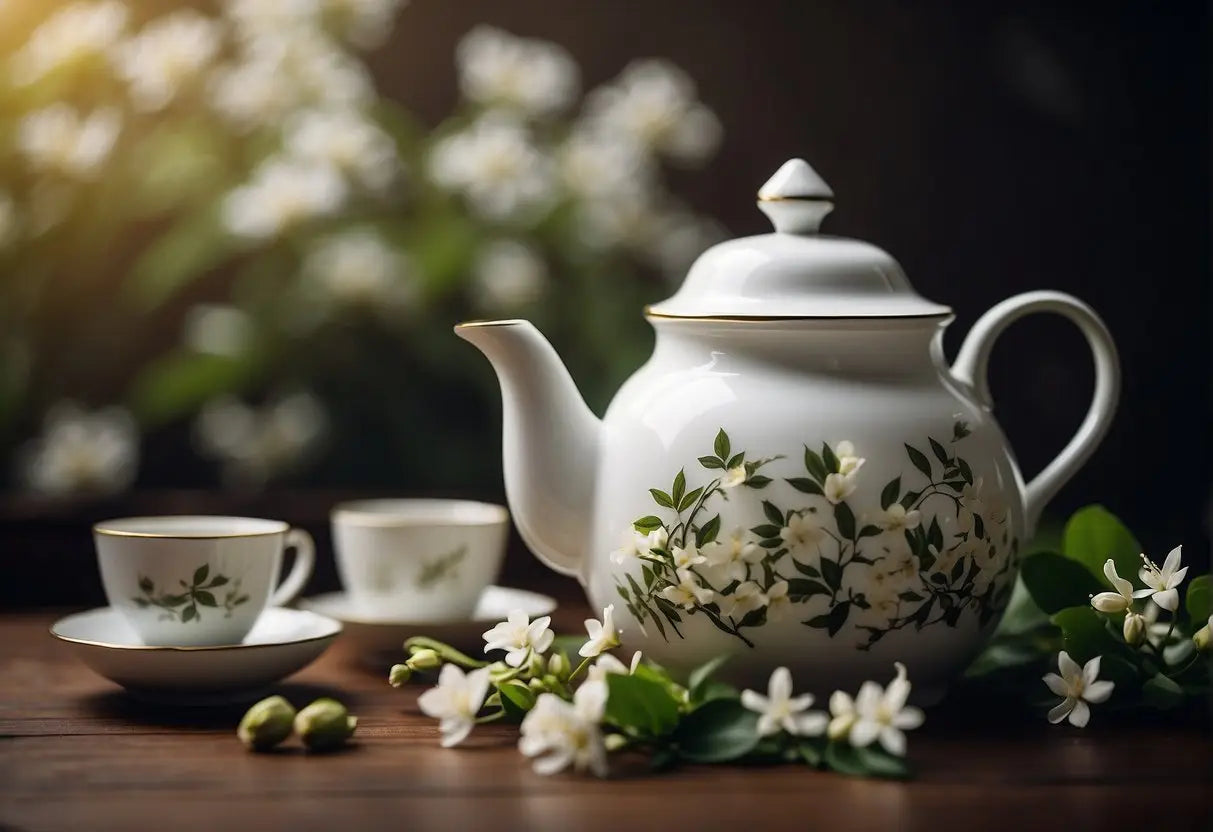
Jasmine tea embodies a rich tapestry of history and cultural practices, particularly in Chinese society where it has been cherished for centuries.
Historical Background
Your experience with jasmine tea is not merely about savoring a beverage; it's a gateway to an ancient world. Jasmine tea originated during the South-Song dynasty. This era saw the tea transport from its birthplace in Persia, through India, finally reaching China. By the Ming Dynasty (1368-1644), jasmine tea became a staple, coinciding with a blooming interest in floral teas among the Chinese nobility.
Jasmine Tea in Chinese Culture
In Chinese culture, you'll find that jasmine tea is more than a drink—it's a symbol of hospitality and a ritualistic centerpiece. It is traditionally served to guests as a warm gesture of welcome. During wedding ceremonies, it symbolizes the sweet union of the bride and groom, while in religious ceremonies, it is used as an offering due to its pure and calming aroma. The preparation and enjoyment of jasmine tea is a cultural marker that underscores the value of subtlety and refinement in Chinese society.
Pairing Food with Jasmine Tea
When selecting foods to accompany jasmine tea, aim for dishes that complement its delicate floral fragrance and subtle sweetness. This fragrant tea pairs especially well with both savory and sweet dishes.
Savory Pairings:
- Dim Sum: The lightness of jasmine tea balances the richness of various dim sum items.
- Grilled Chicken or Fish: Jasmine tea's floral notes underscore the natural flavors of these proteins.
- Salads with Vinaigrette: The tea can help to cleanse your palate between bites of a tangy salad.
Sweet Pairings:
- Pastries and Cakes: Choose light, buttery pastries to harmonize with the tea's sweet notes.
- Fruit Salads: The natural sugar in fruit can enhance the jasmine's subtle sweetness.
- Chocolate: Specifically, white or milk chocolate can pair well, as darker chocolates might overwhelm the flavor.
Spices to Consider: Consider pairing jasmine tea with foods seasoned with:
- Cardamom
- Ginger
- Cinnamon
Each spice can echo the tea's aroma, creating a reinforcing flavor profile.
When planning your tea session:
- Start with small sips of tea before taking a bite of food to establish the jasmine flavor.
- Alternate bites and sips to appreciate how the tea and food mingle.
Remember to steep your jasmine tea properly, as too hot water or oversteeping can bring out bitterness, which may disrupt the harmony with food pairings.
Storing Jasmine Tea
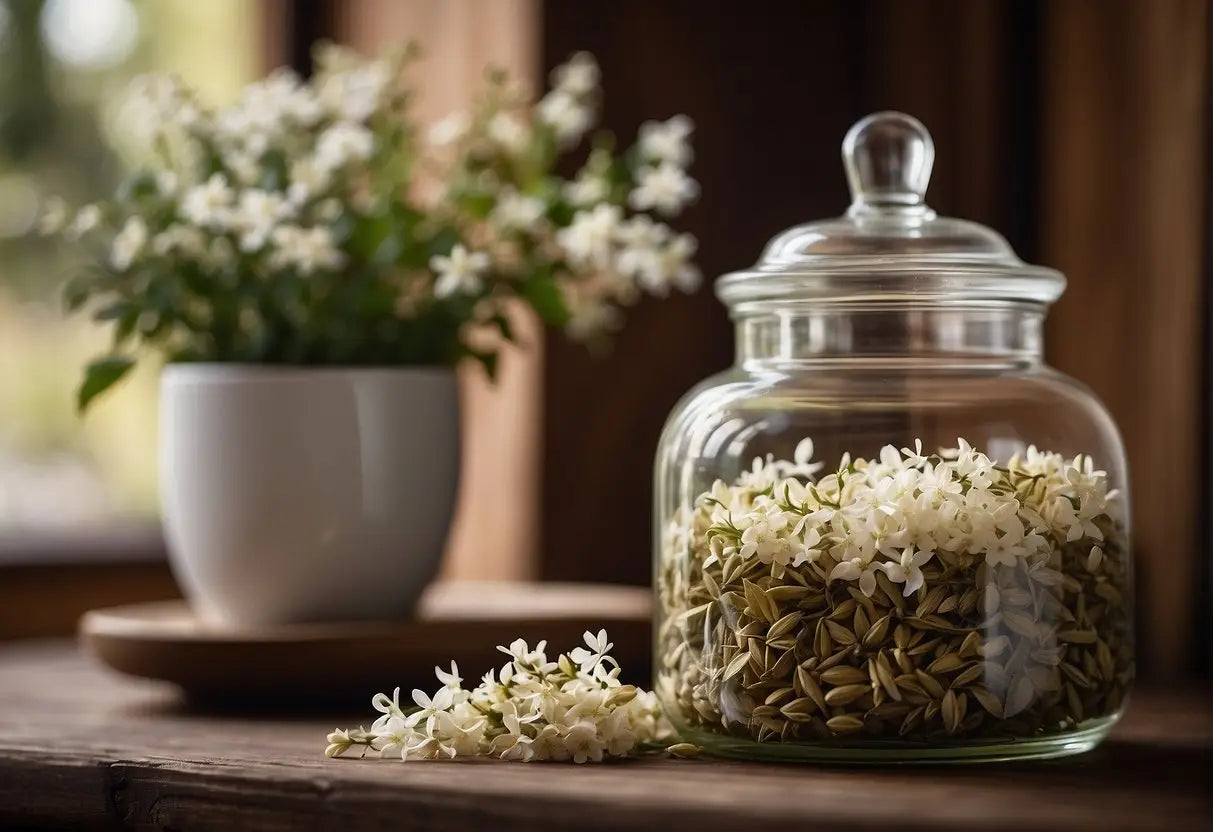
Proper storage of jasmine tea is crucial to maintain its delicate flavor, aroma, and freshness. Here are some tips to help you preserve your jasmine tea effectively:
Location: Store your jasmine tea in a cool, dark place away from direct sunlight, heat, and moisture. A kitchen cupboard away from the stove or any heat-generating appliances is ideal.
Container: Choose an airtight container to keep your jasmine tea. This could be a tin, ceramic jar, or a sealed bag. The purpose is to prevent exposure to air, which can accelerate the deterioration of the tea's quality.
Avoid Odors: Jasmine tea can absorb surrounding odors, which may alter its natural scent. Ensure it's stored away from strong-smelling foods or substances.
Humidity Control:
- If you live in a humid environment, consider including a food-safe desiccant packet inside the container.
- For added protection, you might store your jasmine tea in the refrigerator. If you do, ensure it's sealed tightly to prevent moisture and odorous food contamination.
Shelf Life: While jasmine tea can last a long time, it is generally best enjoyed within a year of purchase. Over time, the flavor and aroma may gradually diminish.
Additional Tips:
- Use clean, dry utensils when handling tea to avoid introducing moisture.
- If possible, only open the container when you're ready to make tea to minimize air exposure.
Potential Side Effects of Jasmine Tea
When you enjoy jasmine tea, it's important to be aware of its potential side effects, despite its popularity and health benefits. Below is a list highlighting some side effects you might experience:
-
Caffeine Content: Since jasmine tea often contains a green or black tea base, you'll be exposed to caffeine, which can lead to restlessness, insomnia, or an increase in heart rate when consumed in large quantities.
-
Allergies: Though rare, if you're sensitive to plants in the olive family, you may experience allergic reactions due to jasmine flowers. Symptoms could include itching, redness, or swelling.
-
Gastrointestinal Issues: In some cases, drinking too much jasmine tea might upset your stomach, leading to discomfort, nausea, or cramps. This is particularly true if you consume it on an empty stomach.
-
Interactions with Medications: Jasmine tea has the potential to interact with certain medications. Specifically, the caffeine component could affect the body’s absorption of drugs like antibiotics or hormonal birth control.
Remember to moderate your intake and consult with a healthcare provider if you experience adverse effects or are on any medications. Moderation is key to enjoying jasmine tea while minimizing potential side effects.
Frequently Asked Questions
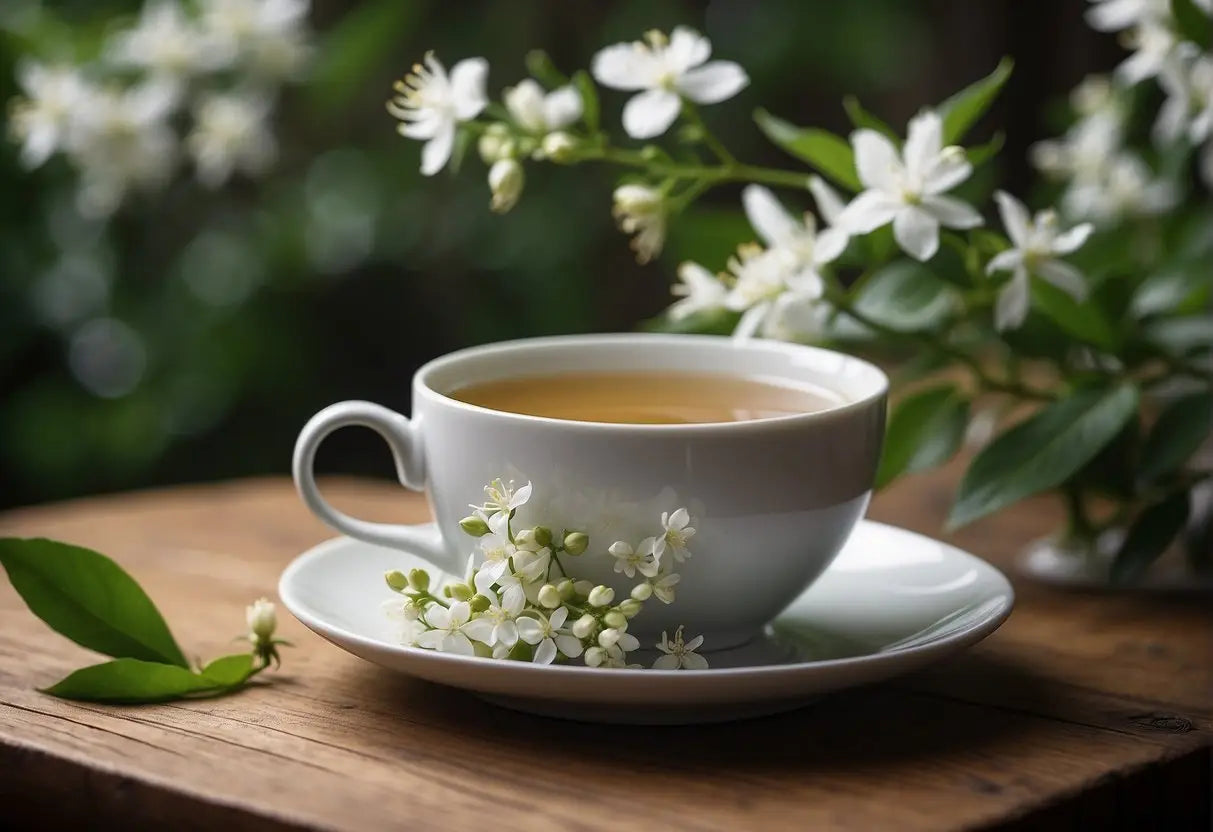
In this section, you'll find concise and specific answers to common inquiries regarding the properties and implications of consuming jasmine tea.
What are the health benefits associated with drinking jasmine tea?
Jasmine tea offers antioxidants which may reduce the risk of heart disease and certain cancers. It also contains compounds that can help relax your nerves.
Can jasmine tea consumption aid in weight loss?
Yes, jasmine tea may boost your metabolism, which can aid in weight loss when combined with a healthy diet and regular exercise.
Are there any side effects to drinking jasmine tea regularly?
Regular intake of jasmine tea is generally safe, though some may experience anxiety or restlessness due to its caffeine content. Excessive consumption may lead to stomach issues.
Does jasmine tea contain caffeine, and if so, how much?
Jasmine tea contains caffeine since it is typically made from green tea leaves. The caffeine content can vary widely but averages around 15-60 mg per cup.
In what ways does jasmine tea benefit the skin?
Drinking jasmine tea can provide anti-inflammatory and antioxidant benefits that may promote healthy skin and aid in the prevention of aging signs.
Are there specific individuals who should avoid drinking jasmine tea?
Pregnant or breastfeeding women, individuals with heart conditions, and those sensitive to caffeine should be cautious and may need to limit their jasmine tea consumption. Consulting with a healthcare provider is advisable.
← Older post Newer post →











